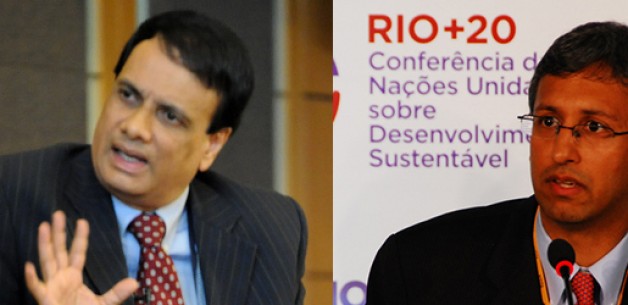Original images by flickr users Asian Development Bank and World Resources (Creative Commons BY-NC 2.0 and BY-NC-SA 2.0, respectively)
Vinod Thomas (left), Director General of Independent Evaluation at the Asian Development Bank, and Manish Bapna (right), managing director of the World Resources Institute, say growth won’t last without sustainability and equality
The IMF-World Bank annual meetings in Tokyo provide the new World Bank chief, Jim Yong Kim, with an opportunity to signal the institution’s goals. With 1.3 billion people worldwide still living on less than US$1.25 a day, the aim should be to end poverty – but with a difference. Economic growth remains the way to lift millions out of poverty, but high growth cannot last unless we confront environmental and social ills.
Much of the credit for poverty reduction in the past decade goes to economic expansion in China and elsewhere. But growing first and cleaning up later will no longer work as water scarcity, forest loss, climate change and income disparities threaten to scuttle lasting growth.
The premise has been that growth is driven by investment in physical capital, such as building roads. Investment in human capital, such as improving health care, has now been recognised as a growth engine too. But investment in natural capital, such as abating water pollution, has received short shrift. Like the three wheels of a tricycle, all three forms of capital are essential.
The approach needs to be built on three pillars. First, we need greater environmental sustainability by lessening resource losses and our carbon footprint. Some 1.2 billion people live in water-scarce regions. More than 1 billion depend on forests, while deforestation threatens livelihoods. Floods and droughts are exacting a toll.
Second, the agenda must promote greater equality by factoring in the regressive effect of certain taxes or subsidies. China, the US and others have seen rising inequalities. Greater inequality reduces the impact of growth on poverty as in India, and breeds social unrest, as in the Middle East. Conversely, greater equality allows for more lasting growth by drawing on all the citizens.
Third, the new directions should embrace universality by addressing the developing and developed countries. Climate change, resource loss and public health require all countries to act. Universal goals will also help allay developing countries’ concerns that the burden will fall disproportionately on them. Furthermore, poverty is unacceptably high in some developed countries too.
In the midst of a global slump, will these concerns not block recovery? The reality is the opposite. It is environmental destruction, climate change and widening inequality that will hinder growth. The new leadership at the World Bank has the chance to chart a renewed agenda to fight poverty by asking nations to ensure growth is environmentally sustainable and socially equitable.
Vinod Thomas is director general of independent evaluation at the Asian Development Bank and formerly the World Bank. Manish Bapna is managing director of the World Resources Institute.

